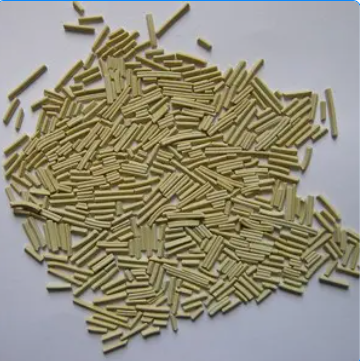Hydrotreating catalysts play a vital role in the refining of petroleum products, particularly in the hydrodesulfurization (HDS) of naphtha, vacuum gas oil (VGO) and ultra-low sulfur diesel (ULSD). These catalysts are critical for removing sulfur, nitrogen and other impurities from crude oil fractions, thereby improving the quality and environmental compliance of the final product. To understand the importance of hydrotreating catalysts, it is necessary to delve into the concept of hydrotreating and the role of catalysts in the process.
What is a hydrotreating catalyst?
Hydrotreating catalysts are substances that promote the chemical reactions involved in the hydrotreating of crude oil fractions. Hydrotreating refers to a set of catalytic processes involving the use of hydrogen to remove impurities and improve the quality of various petroleum products. The main types of hydroprocessing include hydrotreating, hydrocracking, and hydrofinishing, each requiring specific catalysts tailored to the desired reaction.

Naphtha Hydrotreating Catalyst
Naphtha hydrotreating involves removing sulfur, nitrogen and other impurities to meet strict environmental regulations and improve the octane quality of the product. Catalysts used in naphtha hydrotreating are typically based on metals such as cobalt, molybdenum and nickel supported on alumina or other high surface area materials. These catalysts promote hydrogenation and desulfurization reactions to produce low-sulfur, high-octane naphtha suitable for blending into gasoline.
VGO HDS
Vacuum gas oil (VGO) is an important feedstock for a variety of downstream processes, including fluidized bed catalytic cracking (FCC) and hydrocracking. However, VGO often contains high levels of sulfur and nitrogen, which need to be reduced to meet product specifications. Hydrotreating catalysts designed specifically for VGO HDS are carefully formulated to withstand harsh operating conditions and promote the removal of sulfur and nitrogen compounds, resulting in cleaner, more valuable VGO for further processing.
Due to stringent emission standards, ultra-low sulfur diesel (ULSD) is a key product in the modern refining industry. The production of ULSD involves hydrotreating to reduce sulfur content to ultra-low levels. ULSD HDS catalysts are highly selective for desulfurization while minimizing hydrogenation of other components, ensuring required product quality and meeting regulatory requirements.
The role of catalyst
In all these hydrotreating processes, catalysts play a key role in promoting the desired reactions while maintaining long-term stability and activity. The choice of catalyst formulation, including the type and concentration of active metals and support materials, significantly affects the efficiency and selectivity of the hydrotreating reaction. Additionally, advances in catalyst technology, such as the development of new metal-promoted formulations and improved support materials, continue to improve the performance and longevity of hydroprocessing catalysts.
in conclusion
Hydrotreating catalysts are integral to producing cleaner, higher quality petroleum products. As environmental regulations become more stringent, the need for efficient and selective catalysts in hydrotreating processes continues to grow. Ongoing research and development work in catalyst technology aims to further improve the performance and sustainability of hydroprocessing catalysts, ensuring the future production of environmentally friendly fuels and petrochemicals.
Post time: Jun-06-2024

